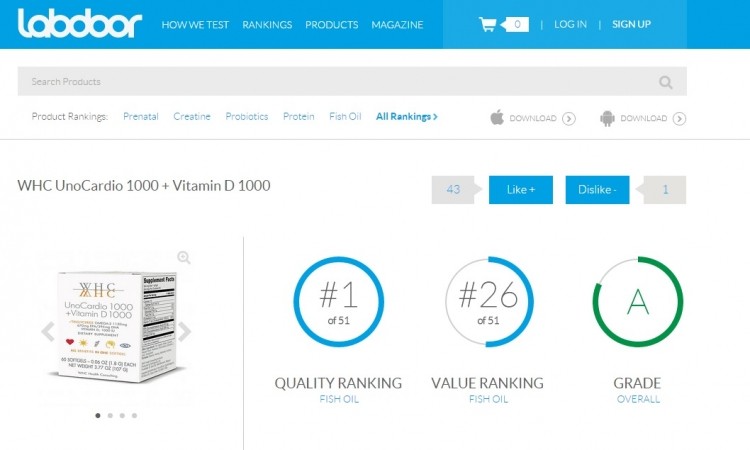Testing firm Labdoor uses transaction-based model to help consumers answer this question: What's best?

Labdoor has tested hundreds of different products in a number of dietary supplement categories, which so far include creatine, prenatal vitamins, protein products, fish oil and probiotics. The products are ranked based on safety, label accuracy, purity, nutritional value and projected efficacy.
Putting the consumer first
Thanedar, who has a background in quality control analytical testing, said the model is a departure from what currently exists in the market. There are a number of certification bodies in existence, but he said that, while not attacking the quality of the testing and auditing that is conducted, in his opinion the data generated in these endeavors doesn’t provide much information to the consumer.
“It was the business model with the problem for me. The payment goes to the lab and the data goes to the company. I wanted payment to come from the consumer and the data to go to the consumer. This is the first time consumers have full access to the data,” Thanedar said.
The products that Labdoor tests are ranked on an alphabetical scale, and are judged against category criteria such as label claim accuracy, nutritional value, safety and projected efficacy. Efficacy is judged both by delivery form and the specifics of the ingredients, for multi ingredient products. For example for products containing minerals, such as the prenatal vitamins, Thanedar said that using more bioavailable forms as elucidated in the literature would garner higher marks. Products are then ranked on both highest quality and best value lists.
The testing that has been done so far has turned up some surprising results. For example in the fish oil category, Labdoor’s testing found that among the 51 fish oil products tested there was a range of about 60% below to about 60% above what the manufacturers claimed for EPA and DHA content. Within the “fish oil” category (there was a krill oil product in there, too), part of the quality rankings rests on a judgement about projected efficacy, with a definite preference in Labdoor’s model for higher concentration products that provide more EPA and DHA per capsule.
Creatine products, by comparison, were much closer to each other overall. The Labdoor website said there was very little difference in the top ten products it surveyed, and overall the category has a much smaller variance in label claim accuracy than did the fish oils. The judgements made in the probiotic category seemed the most problematical. Many in the field would say that “efficacy” and “quality” in this realm needs to be tied to the use of specific, named strains, with studies linked to those specific strains. But Labdoor’s efficacy ratings seem more tied to overall CFU count. For example, one high scoring product contains a named strain, Lactobacillus acidophilus DDS-1, but also contains nine other strains which are called out only as genus and species.

How do we get paid?
Thanedar said that there are other product testing services, such as ConsumerLab, that customers could refer to. But he said he believed the subscription model that ConsumerLab uses was never going to reach enough consumers to make a difference in the marketplace.
“We have found there is a need for this. We have spent the past four years talking directly to consumers and they are confused. There should be a direct correlation between product quality and price and there is not,” Thanedar said. “But our basic problem was, how are we going to get paid for this testing? It’s expensive.”
The model Thanedar and his business partners came up with was to act both as a testing service and as a transaction portal. On the Labdoor site consumers can buy from Amazon or the manufacturer, or can purchase the product directly through Labdoor, which gets a small commission on each bottle sold.
“We had to make the site free and open so anyone could see it to make this work. There are only single digit percentages of consumers who look at our site that actually buy from us. We definitely know we are leaving money on the table, but we wanted to build the business two dollars a bottle at a time,” he said.
“How many different web sites can you go to to figure out all of the different specifications on a car? There was nothing like that in this industry. Only those who are getting the most value out of it will be paying for it. If we don’t solve a problem for consumers we don’t get paid. And the problem we solve is the question, what’s best? We answer that for about half a million consumers a month,” Thanedar said.
Despite the fact that some well known brands have scored low on Labdoor’s rankings, Thanedar said he has been pleased with the reception the concept has gotten from industry.
“We don’t use scare tactics, like the people who say ‘Do you know what’s really in your supplements?’ Our goal is really to find the best products in the market and connect consumers with those companies. We have the attention of millions of consumers,” he said.
“The true goal of Labdoor is to effectively connect the buyer and the seller. We are agnostic about what products we sell. I really don't care. The best companies have a way of seeking us out. I could see down the road a scenario in which we could say to companies, you spend your money on quality and R&D and let Labdoor be your distribution system,” Thanedar said.
















